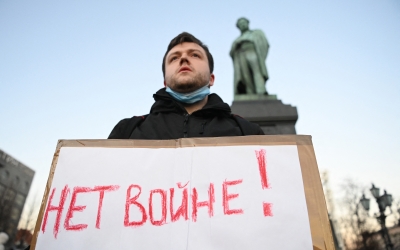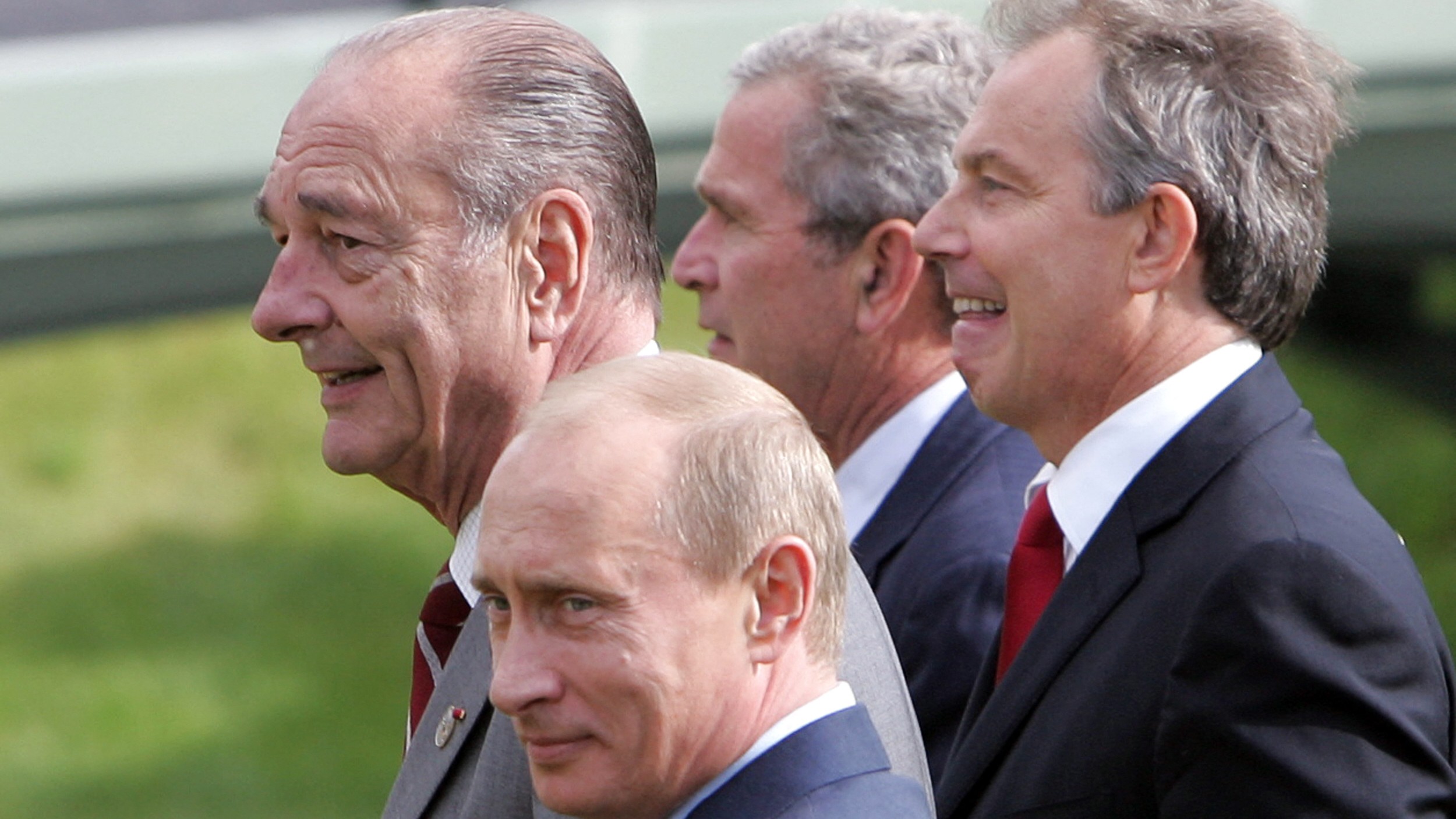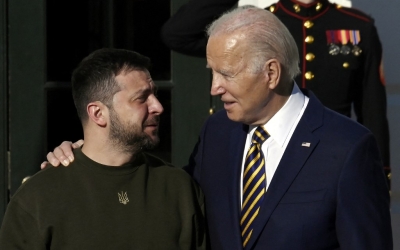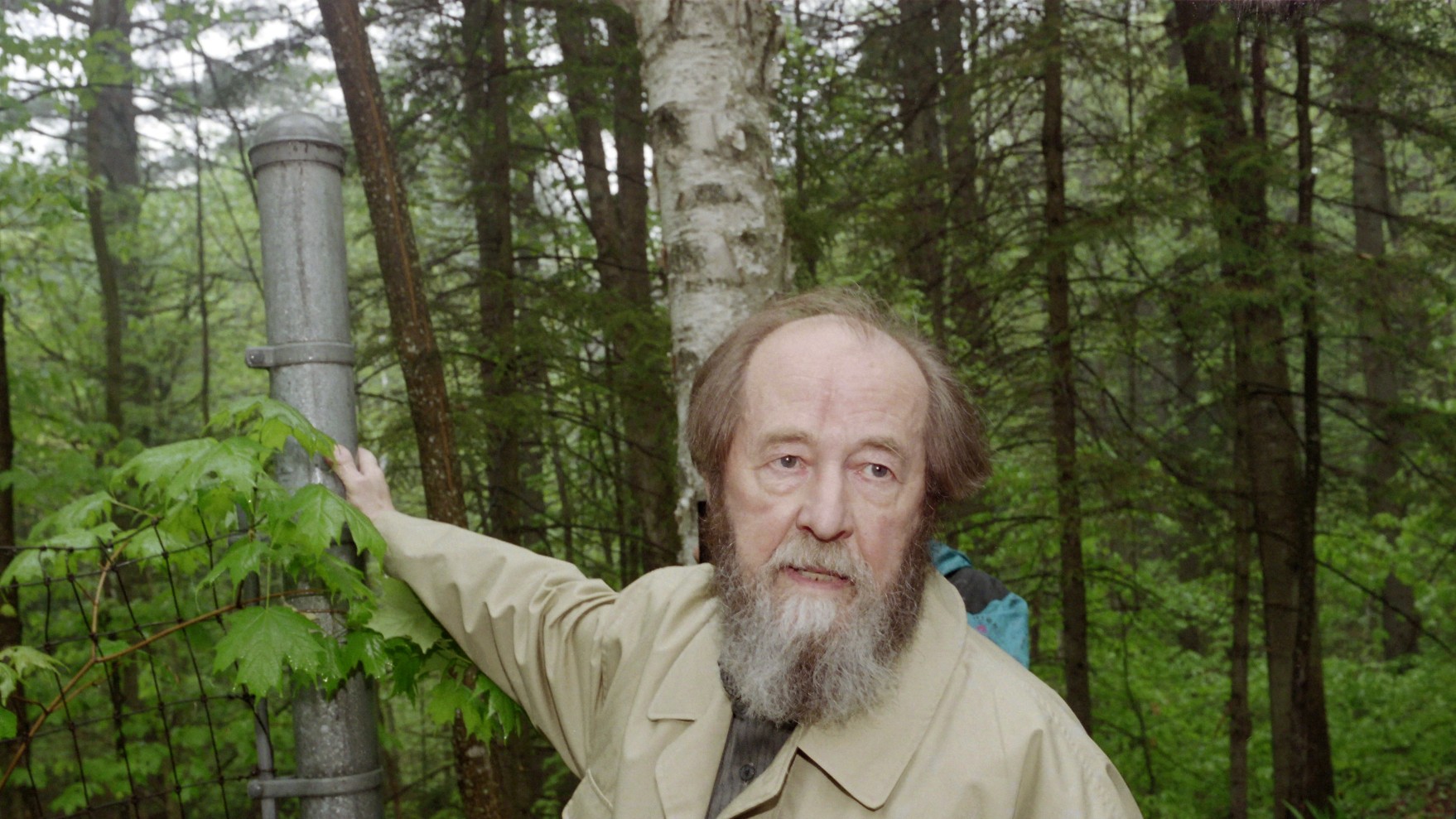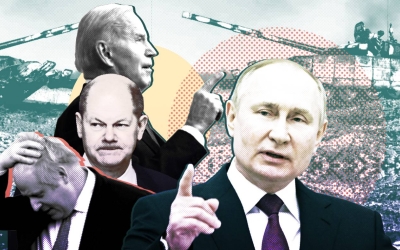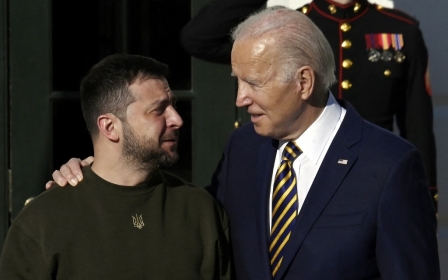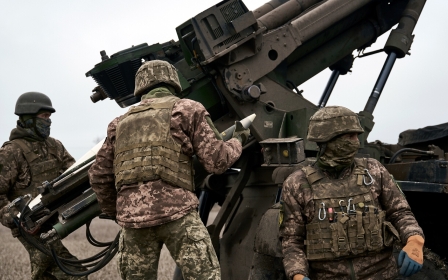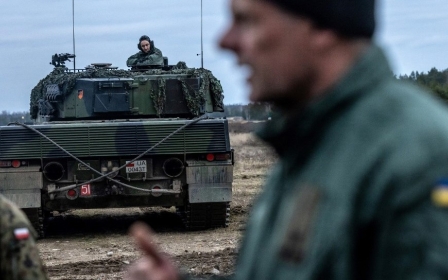Russia-Ukraine war: The many faces of Vladimir Putin
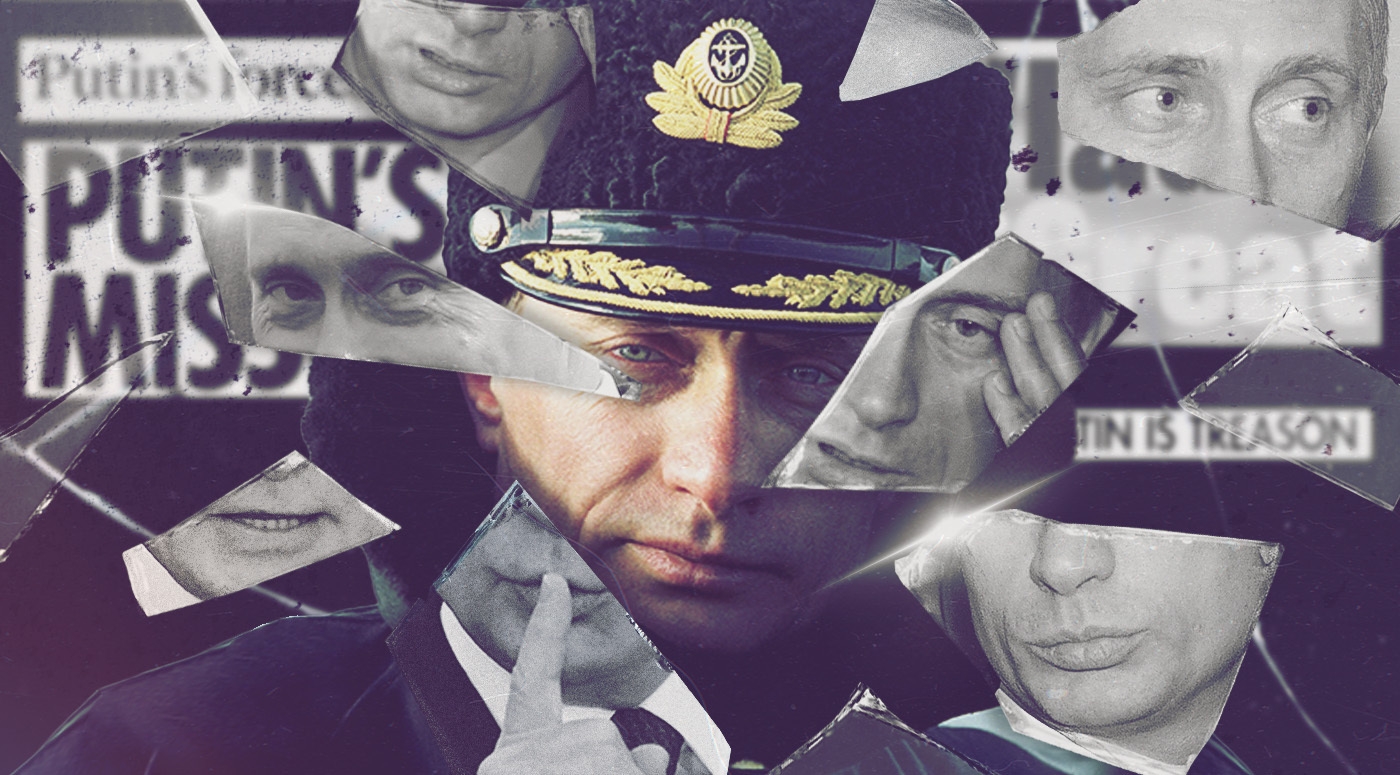
When Russian President Vladimir Putin invaded Ukraine a year ago, many theories were put out to explain such an irrational action.
It was said that he was terminally ill with cancer; or that he had lost touch with reality after two years of self-enforced seclusion during the Covid-19 pandemic - all the tunnels and long white tables had turned his mind; or that he was Homo Sovieticus and this was the revenge of the man who thought the collapse of the Soviet empire was the biggest geopolitical disaster of that century.
Ukraine is no longer a proxy war. It is a war in which Russia and the West are fully invested
Few bothered to read the books that Putin had filled his head with. Or read his speeches. And no one looked back to the time in Russia when Putin emerged, because that would have pointed the finger in the wrong direction.
The decision to invade Ukraine was more than a reaction to the eastward expansion of Nato or the idea that Russia was surrounded by hostile forces.
The rebirth of a Russian nationalist and religious movement to reclaim the space Russia thought belonged to it stemmed directly from the failure of the attempt to westernise post-Soviet Russia.
New MEE newsletter: Jerusalem Dispatch
Sign up to get the latest insights and analysis on Israel-Palestine, alongside Turkey Unpacked and other MEE newsletters
The West’s doctrine of creative destruction as applied to states was first tried in Russia, before being rolled out in Afghanistan and Iraq, and it is to the attempted "creative destruction" of Russia that Putin is a response.
A known quantity
The man who a year ago caused the biggest shock to European security since Hitler marched into the Rhineland was a known quantity.
Putin was not an upstart on the world stage. In fact he can boast to be the longest surviving leader of a nuclear power. Many former western leaders know him well - Silvio Berlusconi, Gerhard Schroder, George W Bush, Tony Blair, Angela Merkel to name but a few.
Anyone who has met Putin will tell you he has had more than one persona in his life, and that indeed his rise to power involved trying on each one in turn, rather as one would a new set of clothes.
During Perestroika, Putin was the loyal second-rank KGB officer ploughing the intelligence fields of a backwater in East Germany. In those days, the front line of Soviet intelligence was Central Asia.
Come the collapse of the Soviet Union, Putin transformed himself into a privatiser, hitching his fortunes to one of the chief ideologues of shock therapy, Anatoli Sobchak, the then mayor of Petersburg. Sobchak was an intellectual and economist with a shambolic private life. He needed an organiser. The quiet, sober, obedient, German-speaking Putin was just the man. He soon became deputy mayor.
Putin took so naturally to the role of flogging off everything that was not bolted to the factory floor, that he nearly came a cropper over a scandal typical of its day. In 1992, Putin was investigated for a $100m barter deal of food for oil. The raw materials had flown, but the food for the citizens of Petersburg never materialised.
Marina Salye was put in charge of the city council investigation into the deal. She told AJ investigations unit in 2012: "The raw materials were shipped abroad but the food didn’t materialise. There’s 100 percent proof that in this Putin was to blame. As a result in 1992 – when there was no food at all – the city was left with nothing.
"The evidence I have is as solid as it gets. We also found out that Putin – well, his committee – made bartering contracts to get food for the city. He issued licences. And commodities – wood, metal, cotton, heating oil, and oil – flew out of the country."
A few weeks after giving that interview, Salye died "of natural causes", a fate that successive whistle-blowers have met.
Putin’s success in St Petersburg drew him to the Kremlin’s attention. Boris Yeltsin, America’s dream Russian president, was failing. He was drunk, depressed and had once tried to take his own life. The oligarchs were taking over, and battles were breaking out among them.
A crude transfer of power
Enter Putin, the man who will get things done.
But note: Putin rose to power not through the disbanded KGB or the men known as the "red directors", the former communist elite who ran industry, nor indeed the Communist Party itself. Putin rose to power through the Family, the corrupt western-backed entourage of Yeltsin, the president who inaugurated Russia’s mafia state.
Putin rose to power through the Family, the corrupt western backed entourage of Yeltsin, the president who inaugurated Russia’s mafia state
Putin had learned one lesson from his brush with death in Petersburg - never to trust an intermediary. From now on, he would arrange all the business deals himself. His ascent through the Kremlin was quick, and when he was chosen as Yeltsin’s prime minister, Putin had to act quickly.
He took out a suitcase filled with the commercial secrets of the oligarchs and set about blackmailing them. All but Mikhail Khodorkovsky inclined to Putin, and Khodokovsky ended up in prison and exile.
The transfer of power was crude, to say the least. In the process, Putin created his own generation of boyars. Putin let his oligarchs make money as long as they showed him their total loyalty. One oligarch even went as far as presenting his new tsar with a Faberge egg.
Putin cut his teeth on launching the second Chechen war which dwarfed in ruthlessness and brutality anything Yeltsin had done in the province in 1994. Putin even fabricated his own pretext. Four apartment blocks in Buynaksk, Moscow and Volgodonsk, were bombed, killing 300 and injuring more than 1000, deaths he blamed on Chechen terrorists.
A fifth bomb was uncovered by residents in Ryazan. Three Russian Federal Security Service (FSB) agents, who had planted the device, were arrested by local police but were released after the FSB director Nikolai Patrushev said it was a training exercise.
Again, anyone investigating the flat bombings ended up on a slab in the mortuary.
Putinism before Putin
Putin was a newcomer to the Russian stage in 1999, but Putinism was already alive and kicking thanks to the western experiment going dangerously wrong.
I came face to face with it as a correspondent in Moscow known for my criticism of Yeltsin. Early on in Yeltsin’s reign, his former bodyguard, and KGB general and right-hand man Alexandr Korzhakov rang me up. He wanted to meet.
What I got when we met was the nationalist patriotic rage of a KGB general who felt that the West was carving post-Soviet Russia up, setting former allies in Georgia, Azerbaijan, Ukraine, Moldova against Moscow, dismembering its nuclear stock pile under the guise of inspection, making its economy subservient to US interests and neutering its once powerful army.
This was before anyone in Moscow had heard of Putin, but it was part of the same well of nationalist resentment that branded Yeltsin and Gorbachev before him as traitors.
Off the record, Korzhakov bitterly described a world where Nato and "Atlanticism" was harmful to Russia. It was an implicit criticism of his master who had handed America not just the wiring plans of an annex being built in the US embassy compound, but the design of Russia’s latest tank.
Korzhakov, among others, was quivering with rage at the division of the Black Sea Fleet with the newly sovereign Ukraine, and particularly the loss of a submarine base in the Black Sea.
A failed western experiment
In truth, the US state-building that was attempted in Afghanistan and Iraq, was tried first in Russia in the 1990s.
Years before the rouble crashed, Russian defaulted on its debts, and the Washington Post asked arrogantly "Who Lost Russia?", it was clear that this experiment in speedy westernisation had failed. But it was not clear then what would follow it. Putin took another eight years to don his final suit of clothes.
In that time, he played the role of the loyal ally, getting the credulous duo Bush and Blair to subsume the butchery going on in Chechnya under their War on Terror. As the victims were Muslim and some were Al-Qaida, who cared?
His rhetorical break with the West came with a fiery speech he gave to the security conference in Munich in 2007, but even then it took four more long years to decide to do something about it. It was only when his then Prime Minister Dmitry Medvedev was persuaded to abstain in a UN security resolution which paved the way for the intervention in Libya, that Putin snapped.
It was perceived US duplicity over the fall of Muammar Gaddafi in Libya that persuaded Putin he should intervene in Syria four years later. In Putin’s eyes, the Arab Spring was a CIA-organised colour revolution of the sort that had taken Serbia, Ukraine and Georgia out of Moscow’s orbit.
The Russian idea
But Russian interventions in Georgia, Syria and Crimea in 2014 were not the only signs of the nationalist movement that was to shape Putin’s invasion of Ukraine.
There were nativist, mystical and religious sources too.
One of the earliest influences on Putin was none other than the western hero of Soviet dissidents Alexandr Solzhenitsyn. At his height, he was regarded by the New York Times and the BBC as the greatest living Russian writer.
Solzhenitsyn’s return to the motherland after years of exile in Vermont was a dramatic affair. A modest airport lounge was too humble a stage for the greatest survivor of the Gulag, the Nobel laureate praised as an "ethical force" for his life and work.
After 20 years in exile, Solzhenitsyn flew to Vladivostok. He then took three months on a slow cross-country route before he arrived, with a BBC crew in tow, at Yaroslavsky Station in Moscow. He could not recognise the Russia he had arrived back in and was not slow to say why.
"No one expected that the leave-taking from communism would be painless. But no one thought it would be so painful," Solzhenitsyn told the crowd who came to greet him at the station. "Russia is living through an orgy of vice and immorality…. We are handing over our children, defenceless, to the insolent forces of vice."
Solzhenitsyn did not say it then. But what he meant was godless Western vice. He was given a weekly chat show on television but was taken off the air after his chats descended into long hectoring monologues.
No-one in New Russia was listening. His audience was more concerned about Western brands opening in Russia. It was Ikea and Auchan not Mother Russia that was captured their attention. But Solzhenitsyn had at least one admirer in Moscow - Vladimir Putin. Solzhenitsyn’s abhorrence of the Western decadence to which New Russia had descended was right up Putin’s street.
Solzhenitsyn also said on more than one occasion that Ukraine did not exist. Putin made sure that Solzhenitsyn’s final home was a dacha in the exclusive woods in Moscow that he craved.
Solzhenitsyn’s brand of Russian Orthodox authoritarianism had deep pre-Soviet roots. One of them was the writings of Ivan Ilyin, a White Russian who fled during the Bolshevik Revolution and died in exile in Switzerland in 1954.
As Santiago Zabala and Claudio Gallo write: "Ilyin opposed Bolshevism and advocated a form of Christian authoritarianism similar to that of the Francisco Franco regime in Spain. Echoing renowned Russian novelist Fyodor Dostoevsky, Ilyin believed Russia had a duty to preserve its traditional autocracy and resist Western liberalism."
Solzhenitsyn’s abhorrence of the Western decadence to which New Russia had descended was right up Putin’s street
There were other Russian thinkers like Vladimir Solovyov and Nicholas Berdyaev. There was also Putin’s adviser Vladislav Surkov who invented the political doctrine of Russia’s "sovereign democracy" that had guided the Kremlin since 2006.
As Surkov’s star waned, he was replaced by Alexandr Dugin. Philosopher, political analyst and one of the leading lights behind the ultra-nationalist National Bolshevik Front and the Eurasia Party, Dugin’s responsibility for the invasion was quickly identified by Ukraine. The car in which he was supposed to be travelling was bombed, killing his daughter Darya.
Dugin argued that the only way for Russia to regain its global influence was if the West was pushed out. To do this Russia must destabilise politics in the US and encourage Brexit. If anyone is the godfather of Russia’s links to the far right in the US and Europe, it is Dugin.
What they all had in common was "the Russian Idea", which Zaballa and Gallo describe as "a set of concepts expressing the historical uniqueness, special vocation and global purpose of the Russian people and, by extension, of the Russian state".
The ethnonationalist Russian Idea is by no means unique. Other ethnonationalisms exist under Western protection. National religious Zionism has a very similar concept in its insistence that Jews are merely "returning" to the land their forefathers were kicked out of.
Narendra Modi's ethnonationalist mission is the Hunduisation of India by unravelling constitutional guarantees to Muslims and Christians.
For three decades after the fall of the Soviet Union, America believed it had the exclusive rights to the use of international force. It still believes it has exclusive rights to define what democracy looks like and who its allies should be.
Ukraine: America's war
So the real question the inhabitants of every major city in Europe and US - but particularly here in the UK - should be asking themselves one year into this European war is what would a Putin guided by "the Russian Idea" do if Ukraine succeeded in expelling its invaders.
What would happen if Russian ground forces were indeed pushed out of the four provinces they occupy by Ukrainian forces armed with Western tanks, artillery and rockets?
Because Russia is no longer a backward country guided by hairy mystics. It has the largest nuclear force in the world. And Ukraine is no longer a "bushfire" post-Soviet war, happening 30 years after all the other regional conflagrations broke out. It's becoming a global conflict.
The first year of this war has witnessed the steady escalation of Western military involvement in Ukraine. First it was drones. Then came battlefield artillery. Then came the HIMARS. Then came armoured personal carriers and soon tanks and, if Britain has its way, possibly fighter aircraft will arrive.
Not just that. Western leaders have reinforced their military support for Ukraine with their political presence on the frontline of their "war against autocracy".
US President Joe Biden’s presence on the front of this battlefield in Kyiv sends a powerful political message to Russia that this is now America’s war, not just Ukraine’s. So do all the other messages coming from Europe that defending Ukraine has become a European cause.
Ukraine is no longer a proxy war. It is a war in which Russia and the West are fully invested. Both sides now speak about it in existential terms. Putin claims his invasion was a pre-emptive strike forced by Nato. Nato claims if Putin wins, other countries in Eastern Europe would be next.
There is no off-ramp for either side, and few countries left to mediate between them.
Enter China
The only power capable of restraining Putin in the event of a humiliating defeat of its conventional forces in Ukraine is China.
For this reason, it now looks like the height strategic folly after the fall of Kabul in Afghanistan, for Biden to have started the pivot eastwards in earnest by announcing China and Russia as geostrategic competitors.
It is reminiscent of the days when the then Secretary of State Condoleezza Rice was so encouraged about how well the US invasion of Iraq was going, that she thought the US could invade Iran at the same time.
For a China crippled by the Covid-19 pandemic, Putin’s direct challenge to Western hegemony came prematurely. In Beijing’s view it was ill-thought out. Not necessarily wrong or unprovoked, but hasty.
The last thing China needs is for Ukraine to spark a Third World War as Poland sparked the Second World War
China is still building its nuclear, naval and ground forces, slowly pushing the envelop of its control beyond the first island chain in the Pacific, with military bases built on reclaimed islands. China views its rise as a regional power, let alone a world power, still as a work in progress.
As much as Beijing may resent what it sees as the unfinished business of Taiwan, war is not good for China, at least not yet. The gradual attrition of Western economic and military influence around the world and the rise of more powerful regional actors definitely is.
But it is not in China’s interests for the full weight of Western military might to be deployed, or for a once struggling Nato to be reinvigorated. Every major Western country is spending more on its defence and Germany is abandoning its post-Second World War pacifism. The last thing China needs is for Ukraine to spark a Third World War as Poland sparked the Second World War.
China’s top diplomat, Wang Yi, told France and Germany that Beijing wanted to "fully restart exchanges" and increase cooperation on issues like climate change and free trade. He also told the Ukrainians that "China does not want to see the crisis being prolonged and escalated". The fact that he hit a brick wall, as the New York Times described it, at the security conference in Munich is not China’s fault.
Rather, it is a sign of how little the Western alliance backing Ukraine is thinking about the end game to this war.
Xi Jinping has already established his distance from Putin on Ukraine on at least one public occasion. On their first face-to-face encounter since the invasion, at the SCO summit in Samarkand, Putin had to acknowledge China’s concerns about the invasion. Beijing did not help Putin by issuing a communique ignoring Ukraine.
They have since held talks and on Wednesday, Putin announced that Xi would visit Moscow, a move that would breach new frontiers.
The problem is that the US has not gone out of its way to establish an incentive for China to keep Putin at arms length. And China could change the balance of power on the ground by arming Russia with weapons more offensive than drones and chips.
Indeed China might persuade itself that the only way to stop Russia going nuclear is to bolster its conventional forces in Ukraine. It's an argument the Russian military has used in reverse many times. Knowing how weak their conventional forces were in relation to Nato, and how feeble they were as a trip-wire, the strategic nuclear force became even more important to Russia. That logic applies even more in war time.
No ending in sight
There is every indication that the war in Ukraine will grow in dimensions. This means that the key speech this week will not be made in Moscow, in Putin’s state of the nation address, or in Warsaw by Biden the same day.
It may be the one that Xi is scheduled to give on Friday. More important is what he decides to do with Putin.
There are a number of scenarios for the year ahead - another collapse of Russian lines in a spring offensive and then negotiations; a stalemate with Ukrainian forces unable to shift Russian defensive positions; or a complete collapse of Russian-controlled territory.
China will be key to each scenario. But if it fails to be, I would not like to be the serving US president or British prime minister, with the finger of a wounded, defeated nationalist Russia poised apocalyptically over the nuclear button.
The views expressed in this article belong to the author and do not necessarily reflect the editorial policy of Middle East Eye.
Middle East Eye delivers independent and unrivalled coverage and analysis of the Middle East, North Africa and beyond. To learn more about republishing this content and the associated fees, please fill out this form. More about MEE can be found here.



